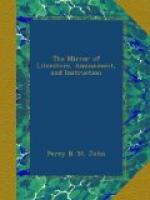he replied to the angry question, “What reason
could you possibly have, Mr. President, for playing
that card?” “None upon earth, I assure
you.” On the morning when news was received
in college of the death of one of the fellows, a good
companion, a
bon vivant, Horne met with another
fellow, an especial friend of the defunct, and began
to condole with him: “We have lost poor
L——.” “Ah! Mr.
President, I may well say I could have better spared
a better man.” “Meaning
me,
I suppose?” said Horne, with an air that, by
its pleasantry, put to flight the other’s grief.
I was talking with Henry James Pye, late poet-laureate,
when he happened to mention the name of Mr. P., a
gentleman of Berkshire, and M.P. I think, for
Reading; “That is the man,” said I, “who
damned the king’s wig in the very presence of
his majesty; with great credit, however, to his own
loyalty, and very much to the amusement of the king.”
“I do not well see how that could be.”
“You shall hear a story which our president (Pye
had been a gentleman commoner of Magdalen College)
told at his own table. The king was out a hunting;
P—— was
in, and
of,
the field; the king’s horse fell; the king was
thrown from the saddle, and his hat and wig were thrown
to a little distance from him: he got on his feet
again immediately, and began to look about for the
hat and wig, which he did not readily see, being,
as we all know, short-sighted. P——,
very much alarmed by the accident, rides up in great
haste and arrives at the moment when the king is peering
about and saying to the attendants, ‘Where’s
my wig? where’s my wig?’ P——
cries out, ’D—n your wig! is
your
majesty safe?’”
* * * *
*
CURIOUS CONCEITS.
While the late Edmund Burke was making preparation
for the indictment before the House of Lords, of Warren
Hastings, Governor-general of India, he was told that
a person who had long resided in the East Indies,
but who was then an inmate of Bedlam, could supply
him with much useful information. Burke went
accordingly to Bedlam, was taken to the cell of the
maniac, and received from him, in a long, rational,
and well-conducted conversation, the results of much
and various knowledge and experience in Indian affairs,
and much instruction for the process then intended.
On leaving the cell, Burke told the keeper who attended
him, that the poor man whom he had just visited, was
most iniquitously practised upon; for that he was
as much in his senses as man could be. The keeper
assured him that there was sufficient warranty and
very good cause for his confinement. Burke, with
what a man in office once called “Irish impetuosity,”
known to be one of Burke’s characteristics,
insisted that it was an infamous affair, threatened
to make the matter public, or even bring it before
parliament. The keeper then said, “Sir,
I should be sorry for you to leave this house under




